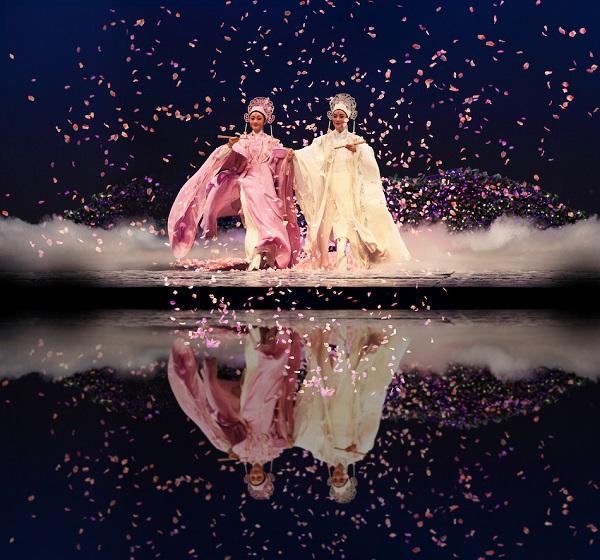From January 1 to 3, 2021, the new version of "Liang Shanbo and Zhu Yingtai", directed by director Guo Xiaonan and starring Yue opera performance artist Mao Weitao, will be unveiled as an exhibition repertoire in the "2021 • Chinese New Year Concert", and at the same time kick off the future New Year's residency performance of the play.
The "Chinese New Year Concert" was created by Mao Weitao when he was the head of the Zhejiang Xiaobaihuayue Opera Troupe, and after more than ten years of ups and downs, it has formed a brand effect so far. The performance of the new version of "Liang Zhu" on January 1 was included in the zhejiang care for overseas Chinese and overseas students in the scientific epidemic prevention live broadcast activities. On the occasion of the New Year's Day, the new version of "Liang Zhu" was broadcast live, hoping to share the excellent traditional Chinese culture and national intangible cultural heritage Yue opera with overseas Chinese at home and abroad.

Stills from the new version of "Liang Zhu" / Courtesy of the organizers
The textual material of Liang Zhu's story was first found in the "Ten Paths and Four Verses" of liang zaiyan in the early Tang Dynasty, a folk tale about "two people in the same window for three years and did not know that Yingtai was a female red makeup", which has a history of more than 1,400 years. After experiencing the polishing and carving of the generation of literati inkers, this poignant love story has a lamentable "afterlife butterfly" ending.
As a local drama in Zhejiang, where Liang Zhu's story takes place, Yue opera has formed an indissoluble relationship with Liang Zhu at the beginning of its birth. In the early days of the development of Yue opera, the old artists of the male class began to perform "Liang Shanbo" on the stage, and after the rise of the women's class in the early 1930s, the improved and innovative "History of Liang Zhu Lamentation" was put on the stage by more Yue opera artists, which was a great success.
In 1951, the East China Yue Opera Experimental Theater Troupe rearranged "Liang Zhu", written by Nan Wei, adding the epilogue "Hua Butterfly". The revised version of the "New Liang Zhu Lamentation History" won a series of awards at the first national opera observation conference in 1952, prompting the birth of China's first color film "Liang Shanbo and Zhu Yingtai" and its global popularity.
More than half a century later, in 2006, in order to celebrate the centenary of the birth of Yue opera, Zhejiang Xiaobaihuayue Opera Troupe invited Chinese contemporary theater director Guo Xiaonan to recreate the Yue opera "Liang Zhu", and this love story was full of new vitality.
Mao Weitao's styling/photo in the new edition of Liang Zhu is provided by the organizers
Under the premise of fully respecting the classics, the new version of "Liang Zhu" complements the development lines of the "Liang Zhu" story and the emotional context of the characters from a more humane and humanistic perspective, making the transformation of Liang Shanbo and Zhu Yingtai from friendship to love more reasonable, while retaining the classic singing segments, it also fully makes this ancient love story that has been recited for many years fully young and interesting and modern aesthetic, realizing the most poetic, romantic and modern integration of Yue opera, which was born in Jiangnan folk drama for a hundred years.
The stage expression of the play "using the fan to symbolize the butterfly" allows the actors to bring out the emotions of the characters and the imagery of the opera through the action and scheduling of the fan in the performance. At the same time, through the integration of modern dance vocabulary into the traditional opera program, the "encounter", "acquaintance", "worship", "separation", "farewell" and "butterfly" of Liang Shanbo and Zhu Yingtai in the whole drama can be presented with the appearance of both classical and modern, both traditional and fashionable, both Chinese and world.
The verse "Dead and Alive Qikuo, Talking with Zi Cheng, Holding the Hand of Zi, and Old With Zi" in "Shijing Shaofeng and Drumming" is repeatedly recited in the play, becoming the theme clue throughout the play. The new version of "Liang Zhu" returns the "legend" to "poetry", and then the "poetry" connects to the contemporary. This is an innovation that can only be achieved if the tradition is truly inherited.
"This is the oldest declaration of love in China, and it is also the ultimate refuge and yearning for the Chinese concept of love." Mao Weitao believes that the use of the new edition of the "Book of Poetry" also represents the progress of the times and society, because only progress and self-confidence can prompt modern people to return to taste the oldest culture and its profound charm.
Generations of Yue opera people adhere to the principle of "keeping right and innovating", adhering to the principle of "respecting the classics, but not following the classics; using the modern, but not abusing the modern", this butterfly that has flown for more than 1,400 years has finally become a classic engraved in the history of art after undergoing repeated transformations. (Guangming Network reporter Gao Mao)
Source: Guangming Network